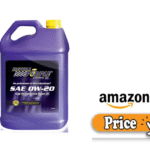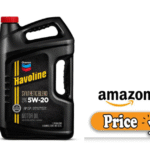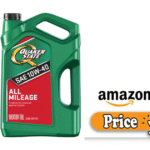In the world of automotive maintenance, the choice of engine oil is a decision that can make or break your engine’s longevity and performance.
Among the top-tier synthetic oils, Amsoil is a brand that consistently earns the trust of mechanics, performance car owners, and fleet managers. Often referred to as the pioneer of synthetic motor oil, Amsoil boasts decades of research, innovation, and real-world results that back its reputation.
In this in-depth Amsoil Engine Oil Review, we’ll walk through every detail from its performance in extreme temperatures to its impact on engine wear and fuel efficiency.
We’ll also compare it to other major brands, share personal experiences, and provide a full FAQ section to help you decide whether Amsoil is the right choice for your vehicle.
What I Like
1. Industry-Leading Wear Protection
Amsoil is renowned for its Signature Series Synthetic Motor Oil, which offers 75% more engine protection against horsepower loss and wear than required by leading industry standards. Whether you’re running a turbocharged performance car or a high-mileage work truck, this oil helps prevent premature engine wear.
2. Extended Drain Intervals
One of the most notable advantages of Amsoil is its extended oil change interval up to 25,000 miles or one year (whichever comes first), depending on driving conditions. This saves time, money, and effort for busy drivers or fleet managers.
3. Outstanding High and Low-Temperature Performance
Amsoil flows freely at sub-zero temperatures, ensuring cold starts are smooth and friction is minimized. At the other end of the spectrum, it resists thermal breakdown under extreme heat and heavy loads, making it ideal for hot climates and towing.
4. Engine Cleanliness
With its robust detergent system and synthetic base, Amsoil keeps engines cleaner by preventing sludge and varnish buildup. A clean engine is a happy engine; it runs more efficiently and lasts longer.
5. Reduced Oil Consumption
Some users notice that their engine burns less oil after switching to Amsoil, particularly in older vehicles. The synthetic formula maintains its structure better under heat and pressure, reducing volatility and consumption.
What Could Be Better
1. Premium Price Tag
There’s no sugarcoating it, Amsoil is expensive compared to conventional oils and even other synthetic options. However, when you factor in the extended drain intervals and enhanced protection, the cost can be justified over time.
2. Limited In-Store Availability
Unlike brands like Mobil 1 or Castrol, Amsoil is not widely available in brick-and-mortar auto parts stores. Most users purchase it online or through certified dealers, which can be a hurdle for those who need oil quickly.
3. Too Advanced for Some Vehicles
Amsoil’s Signature Series is over-engineered for basic, non-performance vehicles. If you drive a budget compact car that sees low annual mileage, you may not see the full benefits, making cheaper synthetics more cost-effective.
4. Requires Trust in Manufacturer Claims
Amsoil publishes its independent testing data, which is generally seen as reliable. However, some skeptics prefer test results from third-party labs or consumer reports. Transparency is good, but more external validation would inspire greater confidence for cautious buyers.
👉🏿👉🏻 Check Latest Price and Offer at Amazon 👈🏻👈🏿
My Personal Experience with Amsoil
I first tried Amsoil Signature Series 5W-30 in my 2015 Subaru WRX after years of using Mobil 1. The engine had roughly 70,000 miles at the time and was starting to show signs of age, occasional ticking during cold start, and slightly rough idling.
Initial Impressions
After the switch, the first thing I noticed was quieter engine operation. Cold starts were smoother, and the oil pressure stabilized more quickly. The oil color remained cleaner longer than I was used to, even after 5,000 miles.
After 10,000 Miles
At the 10K mark, I sent a sample for oil analysis. The results showed minimal wear metals, excellent TBN (Total Base Number) retention and no fuel dilution issues. I felt confident extending to 15,000 miles for my next change, which I’d never done with other oils.
In a High-Mileage Vehicle
I also used Amsoil High-Mileage Synthetic in my 2004 Toyota Highlander (230,000+ miles). Oil consumption dropped by nearly 30%, and idle vibration was noticeably reduced. Even the mechanic commented on how clean the engine internals were during a timing belt replacement.
Overall, Amsoil exceeded my expectations, especially in terms of durability and cold-weather performance.
Design and Technology
Amsoil stands apart due to its proprietary synthetic base stocks and advanced additive chemistry. Unlike Group III “synthetic” oils that start from refined petroleum, Amsoil uses true PAO (polyalphaolefin) synthetic base oils, which offer better stability, lubricity, and volatility control.
Key Technology Features:
- Signature Series: Engineered for performance, turbochargers, direct injection, and long drain intervals.
- Max-Duty Diesel Oil: Designed for extreme towing, heavy-duty diesel engines, and commercial fleets.
- Synerlec and Boosted Zinc Additives: Provide enhanced protection against wear and oxidation.
- OE and XL Series: Tailored for everyday drivers with more conventional maintenance schedules.
Amsoil’s rigorous lab testing and real-world validation ensure that each product meets or exceeds API, ILSAC, and OEM standards.
Performance and Efficiency
Fuel Economy Gains
By reducing friction and internal resistance, Amsoil improves fuel economy slightly, especially in vehicles with turbocharged engines or tight tolerances. The gains aren’t dramatic (1–2 MPG in most cases), but over time they make a difference.
Turbocharger Protection
Modern engines with turbos generate enormous heat. Amsoil maintains viscosity and film strength, reducing the risk of turbo wear or failure. This is crucial, as turbo repairs can cost thousands.
Protection Against LSPI (Low-Speed Pre-ignition)
Amsoil Signature Series meets the GM dexos1 Gen 2 specification, offering protection against LSPI, an issue in modern turbocharged direct injection engines that can cause catastrophic damage.
Oxidation and Shear Stability
Even under high heat and extended use, Amsoil resists breakdown and viscosity loss. Its formula maintains thickness and cling, keeping critical components protected even after thousands of miles.
Build Quality and Packaging
Amsoil’s packaging reflects its professional-grade positioning. The bottles are durable, well-labeled, and easy to handle.
Unlike some brands that use thin plastic or hard-to-read labels, Amsoil’s containers feel sturdy and easy to pour, minimizing mess during oil changes.
Attention to Detail
- Batch numbers for traceability.
- Clear markings for viscosity grades.
- QR codes for product information.
- Environmentally responsible packaging initiatives.
When you handle an Amsoil product, you can feel the engineering attention to detail, a small touch, but one that reflects the company’s overall commitment to excellence.
Alternative Options to Amsoil
While Amsoil leads in many categories, here are some noteworthy alternatives:
1. Mobil 1 Extended Performance
One of the most widely available synthetic oils, Mobil 1 offers 15,000-mile protection and excellent cold-weather performance.
2. Royal Purple
Known for its proprietary Synerlec additive, Royal Purple is a performance-focused oil that also offers extended drain capabilities. Great for high-stress applications.
3. Pennzoil Ultra Platinum
A high-performing synthetic oil made from natural gas using PurePlus technology. It’s a solid competitor at a slightly lower price point.
4. Valvoline Advanced Full Synthetic
Affordable and reliable, Valvoline provides solid engine protection for everyday drivers. It doesn’t match Amsoil’s longevity but performs well for 5K–7K intervals.
Read More: AMSOIL vs Valvoline: A Comprehensive Comparison of Synthetic Motor Oils
Final Thoughts: Is Amsoil Worth It?
In short, yes, if you demand the best. Amsoil is not for everyone. It’s more expensive and may be overkill for the average commuter. But if you own:
- A performance vehicle
- A high-mileage engine
- A turbocharged or direct-injected car
- A diesel truck or heavy-duty machine
Then, Amsoil Engine Oil offers unmatched protection, peace of mind, and long-term savings.
Pros:
- Exceptional wear and heat protection
- Longest drain intervals in the industry
- True full synthetic PAO base oil
- Improved fuel efficiency and performance
- Cleaner engines over time
Cons:
- Higher upfront cost
- Not sold in most retail stores
- Overkill for basic, low-stress vehicles
Overall Rating: 9.4/10
For drivers who want the best possible care for their engine, Amsoil delivers on every front.
FAQs: Amsoil Engine Oil Review
1. How often should I change Amsoil Signature Series oil?
You can go up to 25,000 miles or 1 year between changes with normal driving. Severe conditions may reduce that to 15,000 miles.
2. Is Amsoil better than Mobil 1?
In many lab and field tests, Amsoil outperforms Mobil 1 in wear protection, oxidation resistance, and viscosity retention. However, Mobil 1 is more accessible and still a top-tier choice.
3. Can I mix Amsoil with other oils?
Yes, Amsoil is compatible with other conventional and synthetic oils, but for best results, it’s advised to use it exclusively once you switch.
4. Is Amsoil API certified?
Yes. Most Amsoil products meet or exceed API SN, SP, and other modern specifications. Always check the label for specifics.
5. Does Amsoil improve fuel economy?
Yes, by reducing friction and engine drag, Amsoil can improve fuel economy by 1–2 MPG in most modern engines.
6. Is Amsoil good for diesel engines?
Absolutely. Amsoil offers Max-Duty Diesel Oil, specifically designed for heavy-duty trucks, agriculture equipment, and commercial fleets.
7. Where can I buy Amsoil?
Amsoil is sold through independent dealers, on their official website, and on select online marketplaces like Amazon.
8. Is Amsoil safe for high-mileage engines?
Yes. Amsoil has a dedicated High-Mileage Synthetic Oil that includes seal conditioners and additives to reduce leaks and oil consumption.




